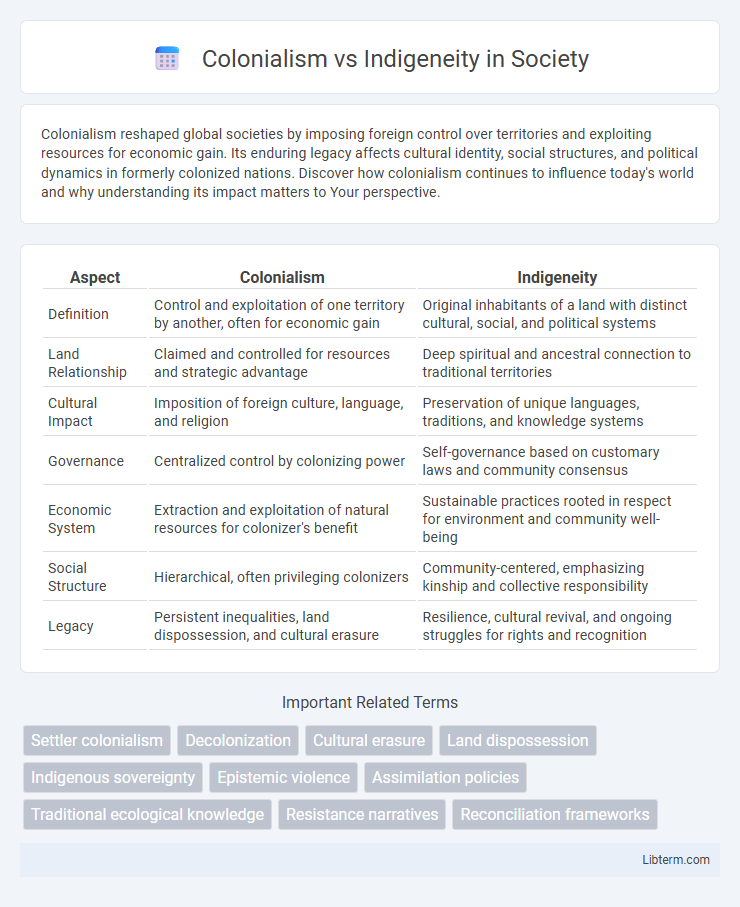Colonialism reshaped global societies by imposing foreign control over territories and exploiting resources for economic gain. Its enduring legacy affects cultural identity, social structures, and political dynamics in formerly colonized nations. Discover how colonialism continues to influence today's world and why understanding its impact matters to Your perspective.
Table of Comparison
| Aspect | Colonialism | Indigeneity |
|---|---|---|
| Definition | Control and exploitation of one territory by another, often for economic gain | Original inhabitants of a land with distinct cultural, social, and political systems |
| Land Relationship | Claimed and controlled for resources and strategic advantage | Deep spiritual and ancestral connection to traditional territories |
| Cultural Impact | Imposition of foreign culture, language, and religion | Preservation of unique languages, traditions, and knowledge systems |
| Governance | Centralized control by colonizing power | Self-governance based on customary laws and community consensus |
| Economic System | Extraction and exploitation of natural resources for colonizer's benefit | Sustainable practices rooted in respect for environment and community well-being |
| Social Structure | Hierarchical, often privileging colonizers | Community-centered, emphasizing kinship and collective responsibility |
| Legacy | Persistent inequalities, land dispossession, and cultural erasure | Resilience, cultural revival, and ongoing struggles for rights and recognition |
Understanding Colonialism: A Historical Overview
Colonialism refers to the practice of acquiring and maintaining control over indigenous lands and peoples, often through political domination and economic exploitation, primarily during the 15th to 20th centuries. It involved the imposition of foreign governance, culture, and social structures that disrupted indigenous societies and economies. Understanding colonialism's historical impact is crucial for recognizing the lasting legacies of inequality, land dispossession, and cultural erasure experienced by indigenous communities worldwide.
Defining Indigeneity: Identity, Land, and Rights
Indigeneity encompasses the unique cultural identities, ancestral lands, and inherent rights of Indigenous peoples, rooted in longstanding connections to specific territories predating colonial rule. The recognition of Indigenous identity involves affirming traditional knowledge systems, languages, and community governance structures that contrast with imposed colonial frameworks. Land rights are central to Indigenous claims, emphasizing stewardship, sovereignty, and the need for legal mechanisms to protect territories from exploitation and dispossession.
The Impact of Colonialism on Indigenous Societies
Colonialism profoundly disrupted indigenous societies by dismantling traditional governance, imposing foreign economic systems, and eroding cultural identities. The forced displacement and assimilation policies led to significant loss of indigenous languages, customs, and ancestral lands. This systemic marginalization has resulted in lasting socio-economic disadvantages and intergenerational trauma within indigenous communities worldwide.
Resistance and Resilience: Indigenous Responses to Colonization
Indigenous communities have demonstrated profound resistance and resilience in response to colonization through diverse strategies such as cultural preservation, language revitalization, and legal challenges to assert sovereignty. These efforts counteract the systemic erasure imposed by colonial regimes, reinforcing Indigenous identities and fostering intergenerational knowledge transmission. Scholarly research highlights movements like the Idle No More campaign and the revitalization of Indigenous governance models as pivotal examples of ongoing Indigenous empowerment and resistance.
Cultural Erasure and Revitalization: Language, Tradition, and Heritage
Colonialism imposed systematic cultural erasure by suppressing indigenous languages, traditions, and heritage to assimilate native populations. Efforts of cultural revitalization emphasize reclaiming and preserving indigenous languages through immersion programs, traditional practices, and heritage education. Revitalization initiatives use digital media and community-led projects to strengthen indigenous identity and resist ongoing colonial legacies.
Land Rights and Resource Extraction: Ongoing Conflicts
Land rights disputes persist between colonial legacies and Indigenous sovereignty, with Indigenous communities asserting claims over ancestral territories legally undermined by colonial powers. Resource extraction industries frequently operate on Indigenous lands without Free, Prior, and Informed Consent (FPIC), exacerbating environmental degradation and violating inherent Indigenous rights recognized under international law, such as the United Nations Declaration on the Rights of Indigenous Peoples (UNDRIP). Ongoing conflicts intensify as Indigenous resistance movements challenge extractive projects to reclaim land stewardship and protect ecological sustainability.
Decolonization Movements: Voices and Strategies
Decolonization movements prioritize the restoration of Indigenous sovereignty, land rights, and cultural heritage through grassroots activism, legal challenges, and political advocacy. Indigenous leaders emphasize the importance of language revitalization, traditional knowledge systems, and community-led education as strategies to counter colonial narratives and reclaim identity. These movements leverage international frameworks like the United Nations Declaration on the Rights of Indigenous Peoples (UNDRIP) to assert self-determination and demand reparative justice.
Intersectionality: Gender, Class, and Colonial Power
Colonialism imposed hierarchical structures that enforced gender and class inequalities while marginalizing Indigenous identities and knowledge systems. Intersectionality reveals how Indigenous women face compounded oppression through colonial patriarchy, economic exploitation, and cultural erasure. Analyzing these overlapping systems of power highlights the resilience and resistance strategies rooted in Indigenous feminist and decolonial movements.
The Role of Education in Colonial and Indigenous Narratives
Education has been a fundamental tool in colonial narratives, often used to impose Western knowledge systems and erase Indigenous identities. Indigenous education emphasizes cultural preservation, language revitalization, and community-driven knowledge, countering colonial legacies. Integrating Indigenous perspectives in curricula fosters reconciliation and challenges the dominance of colonial epistemologies.
Toward Reconciliation: Pathways to Justice and Equity
Toward reconciliation, addressing the entrenched impacts of colonialism requires centering Indigenous voices and recognizing their inherent rights to land, culture, and governance. Pathways to justice and equity include land restitution, legal reforms respecting Indigenous sovereignty, and inclusive policy-making that dismantles systemic barriers. Genuine reconciliation involves ongoing dialogue, education, and resource redistribution to repair historical harms and enable Indigenous self-determination.
Colonialism Infographic

 libterm.com
libterm.com